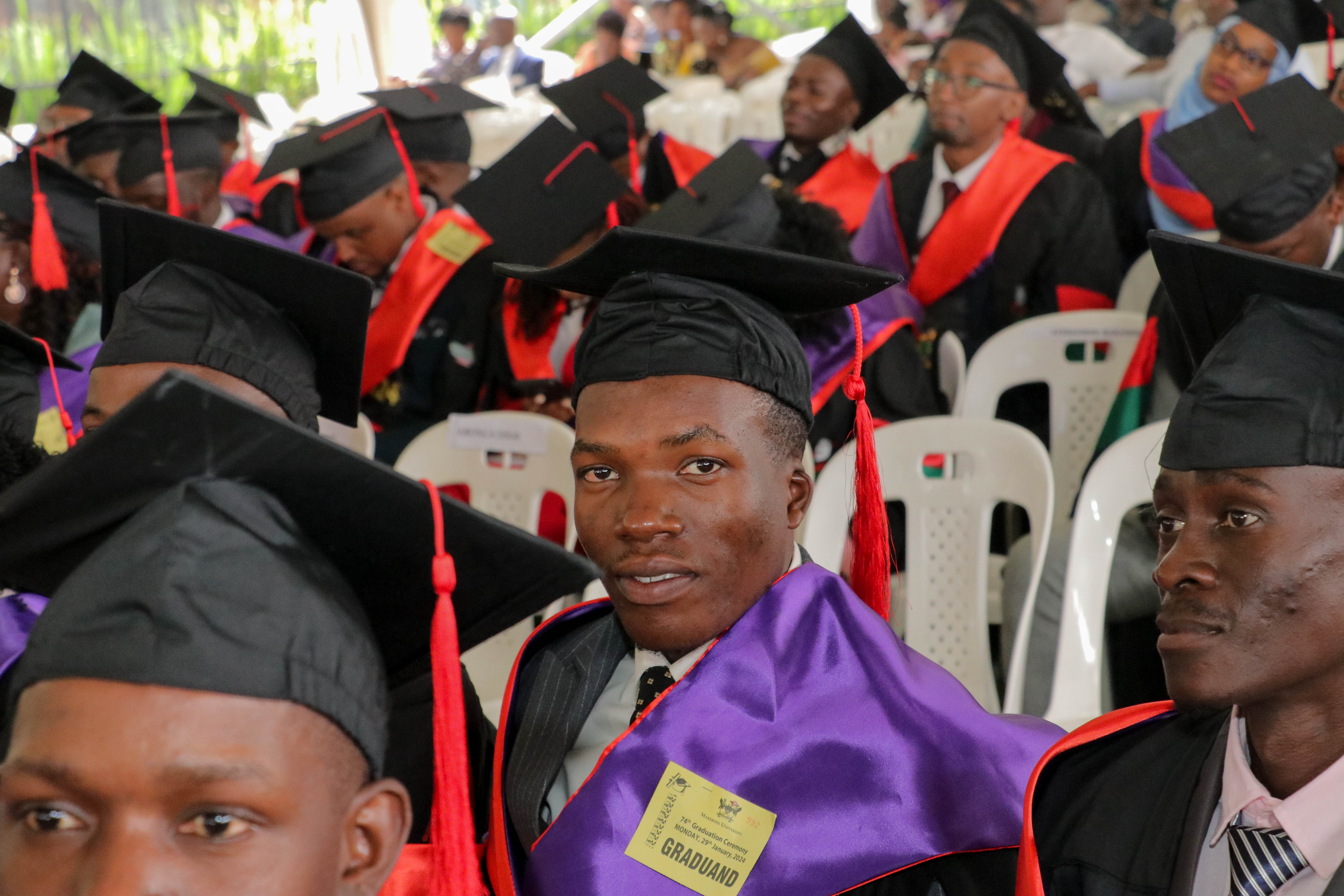
Shafik Senkubuge, aged 24, graduated from Makerere University with a Degree in Bachelor of Environmental Health Science on January 29. Before emerging as one of #Mak74thGrad’s stars from the College of Health Sciences (MakCHS), he confronted financial constraints and personal challenges. Despite this, he discovered the wisdom and resilience needed for his academic prowess to shine brightly.
He graduated with a Cumulative Grade Point Average (CGPA) of 4.46 out of 5.00, earning First Class Honors and securing a spot on the Vice Chancellor’s List. Following the tradition at Makerere University School of Public Health (MakSPH), he will be awarded for his meritorious completion by the Vice Chancellor, Prof. Barnabas Nawangwe.
Senkubuge entered MakSPH after missing his dream course, Bachelor of Medicine and Bachelor of Surgery, due to low points. Despite setting a target of 19 points, he obtained 15 points in Biology (03), Chemistry (04), Mathematics (06), and earned an additional point in ICT and General Paper (GP) at Mengo Senior School.
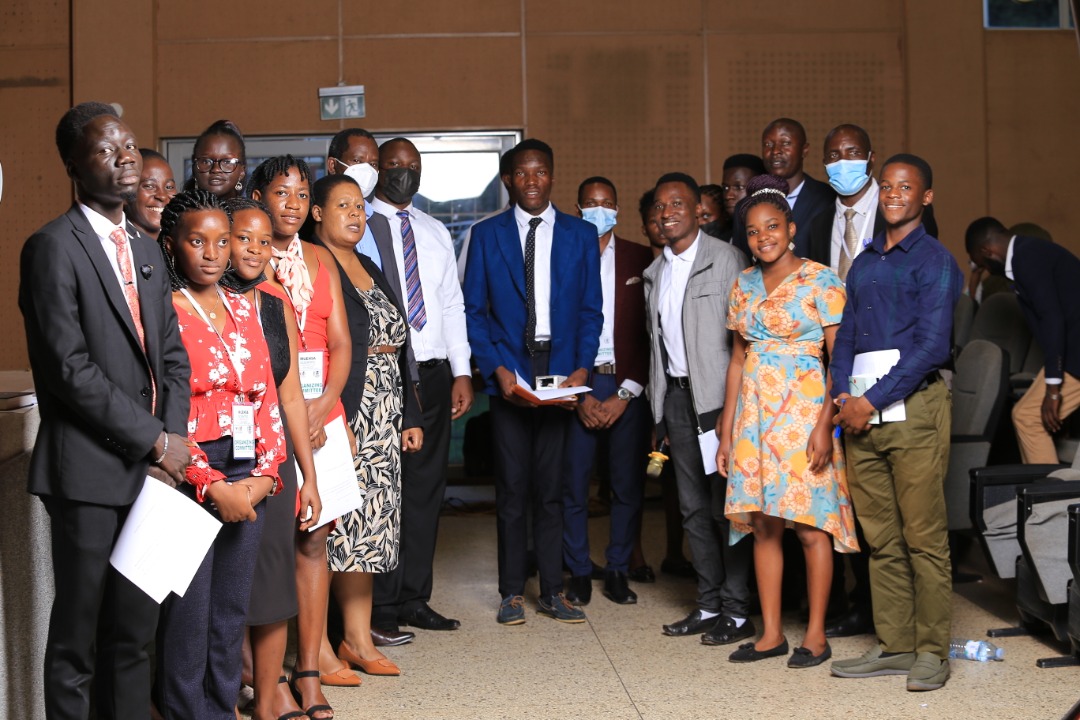
Background
Back in time on April 24, 2000, Kasozi Mohammed, a boda boda rider in Kampala, and Pamela Nambusi welcomed a son, whom they later named Shafik Senkubuge. This was in the neighborhoods of Kawanda Namalere in Nangabo, Kyadondo, a district in Central Uganda's Wakiso region. His family later relocated to Kagoma Village in Maganjo Parish, Nabweru Subcounty, and subsequently to Nansana Municipality, approximately 9.6km from the center of Kampala, the capital of Uganda.
This is where he calls home. Shafik is the firstborn in a family of three, with two younger sisters. Recently, [his father] informed him about having two additional sisters. Despite communication between his parents, they do not reside together, and his father has a second wife.
At present, his father works as a motorcycle taxi (Boda Boda) rider in Nabweru, a Kampala suburb close to Kawempe. His mother, who is self-employed, is currently establishing a small business specializing in decorations for parties, graduations, and introductions in Nansana, after several setbacks brought about by the pandemic.
A 2022 Twaweza report revealed that up to 55% of Ugandans who started businesses in the past five years had to close them due to coronavirus disruptions, declining demand, and heavy taxation.
Despite relying on her job as a hair designer for nearly her entire adult life, Pamela, Shafik's mother, couldn't withstand the impact of the pandemic. In 2020, she was forced to close down her salon after failing to raise the rent.
“During the lockdown, we had a lot of demands as a family and she couldn't accommodate the saloon business rent. She had a very huge debt that accumulated, the landlord decided to request her to leave the house for another person. She left the house, took all her equipment home and after COVID-19 she failed to resume the same business due to financial constraints,” Shafik narrates.
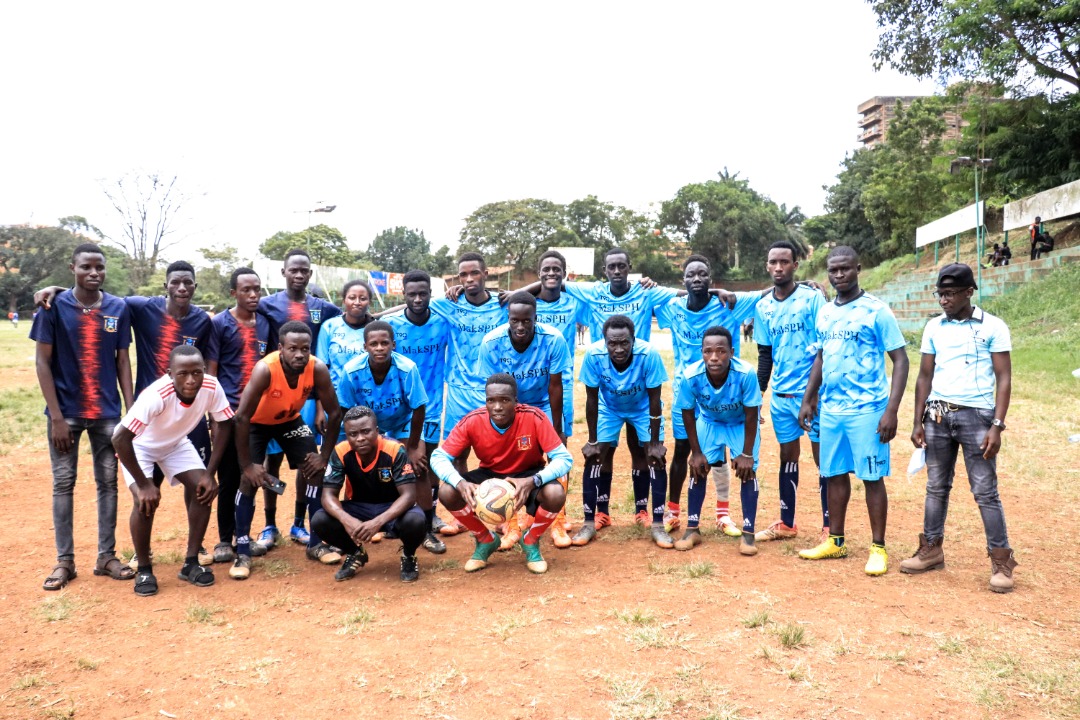
This occurred during a crucial period as he was entering university. Fortunately, his mother had taken up brick-laying during lockdown. It was in this endeavor that he focused his efforts to secure tuition funds, in case he were to enroll in university.
Shafik's academic journey commenced in 2004 at Kawempe Junior. His interest in Science and Mathematics was sparked by a dedicated teacher at Melody Junior School, where he enrolled in 2009. This initial spark paved the way for his remarkable academic journey.
After completing primary two and transitioning to primary three in 2008, Shafik's family relocated to a new home in Nansana, constructed by his father. In 2009, Shafik joined a new school, Melody Junior School in Nansana, where he adapted to a new environment and made new friends.
In P.7, he achieved a remarkable feat, earning one of the only four first grades in the school, scoring an impressive 12 points.
“As the firstborn, my mother rejoiced, but concerns arose about my future after primary school due to financial constraints. Despite manageable primary school fees, I graduated with a debt. Upon retrieving my certificate, we settled the debt when I was already in senior one. My mother, balancing happiness and worries, pondered on how to secure my entry into secondary school, especially with my sister in primary five and our youngest sibling born in 2011, just around a year old,” recalls Shafik.
In 2014, still uncertain about his next steps, Shafik's uncle, Patrick Ssenabulya, facilitated his placement through his NGO at St. Kizito Katikamu Kisule in Wobulenzi, Luweero district.
Beginning secondary school in Luweero with an impressive score of 12 aggregates, Shafik aspired to excel despite being among classmates with 4 and 6 aggregates. Establishing a close bond with his friend Kayondo Joseph, the duo navigated senior one to senior four with intense discussions and friendship together.
Despite grappling with math challenges, he motivated me to confront them, and together we succeeded. In the first term, he ranked 17th out of 178 students, bringing immense joy to my mother. In the subsequent term, he secured the third position and maintained the second position consistently until completing senior four, including in UNEB exams.
“When I went back home, my mom was very happy. I remember she slaughtered a chicken for me,” recalls Shafik.
St. Kizito Katikamu Kisule, a Catholic-founded school, groomed him and exposed his potential. “We used to go to church every day, they groomed us to be humble students and be disciplined. This helped us a lot and groomed us to be competitive even in academics,” he recalls
Despite achieving 16 aggregates at the Uganda Certificate of Education (UCE) from his humble school, Shafik's pursuit of a better education brought him to Mengo Senior School. There, he encountered new challenges, including a transition from boarding to day school, involving long walks back home. Despite these obstacles, he upheld a strong work ethic, gaining valuable lessons in time management and determination.
His mother provided a daily transport allowance of Shs3000, which had to cover both transport and break. To save money for his evening commute, he would skip the break tea, leaving him with only lunch to last until he left school at 5:00 PM. This routine persisted throughout his two years at Mengo SS, and his academic performance suffered significantly during that period.
“The first points I got were seven points, and this did not change up to our Mock examinations where I got to 10 points. Being at Mengo SS, made me learn even if you are brilliant, you need to have some extra tactics and thus we used to work so hard and we did serious calculations.
I remember sometimes going to another school, Kasubi Senior School, where we would study until 10:00 pm and then head back home. This allowed us to avoid the traffic jam that usually builds up around 8:00 pm," he recollects.
Upon completing his Form 6, fate led him to a teaching position at his former primary school. The abrupt closure of schools due to the pandemic forced him to adapt, and he embraced brickmaking as a means of sustaining himself. Despite numerous challenges, Shafik's resourcefulness and tenacity shone through.

A few weeks into the semester, the President announced a second lockdown, which, according to him, turned out to be a blessing in disguise. Uncertain about how to cover tuition and registration, a good samaritan, Longman Musige, a friend of my mother, stepped in and pledged to provide one million each semester. Despite already giving me one million, an additional 1.8 million was still needed for semester registration.
“Upon reflection, we had crafted our bricks, but when the lockdown hit, we struggled to find funds to heat them and cover the remaining tuition. Despite burning the bricks, selling them proved challenging, leaving my mom anxious about my exam fees. Eventually, with support from Musawo Kaliro, contributions from friends, and brick sales, I managed to register for the online exams for the first semester,” he says.
Adding that; “Post-exams, my GPA stood at 4.9, providing a promising start towards achieving a first-class degree. Progressing through semester one and two, I maintained my diligence and benefited from my mom's prayers. However, challenges arose during the exams in the second semester of year two.”
His classmates initiated a campaign to raise tuition for him, managing to gather only Shs. 1.4 million from well-wishers. This fell short of the Shs. 4.7 million required to clear the previous semester and cover the new one. His last resort was writing a letter to the Dean of MakSPH, seeking financial assistance.
"I detailed my financial situation, attached my results slip, and presented the funds I had collected. I was delighted to learn that she granted me a scholarship of 3.5 million. This not only cleared my backlog but also covered the third-year functional fees. With this support, I moved to University Hall for my third year, allowing me ample time for studies and fulfilling my leadership roles as MUEHSA president and college speaker.”
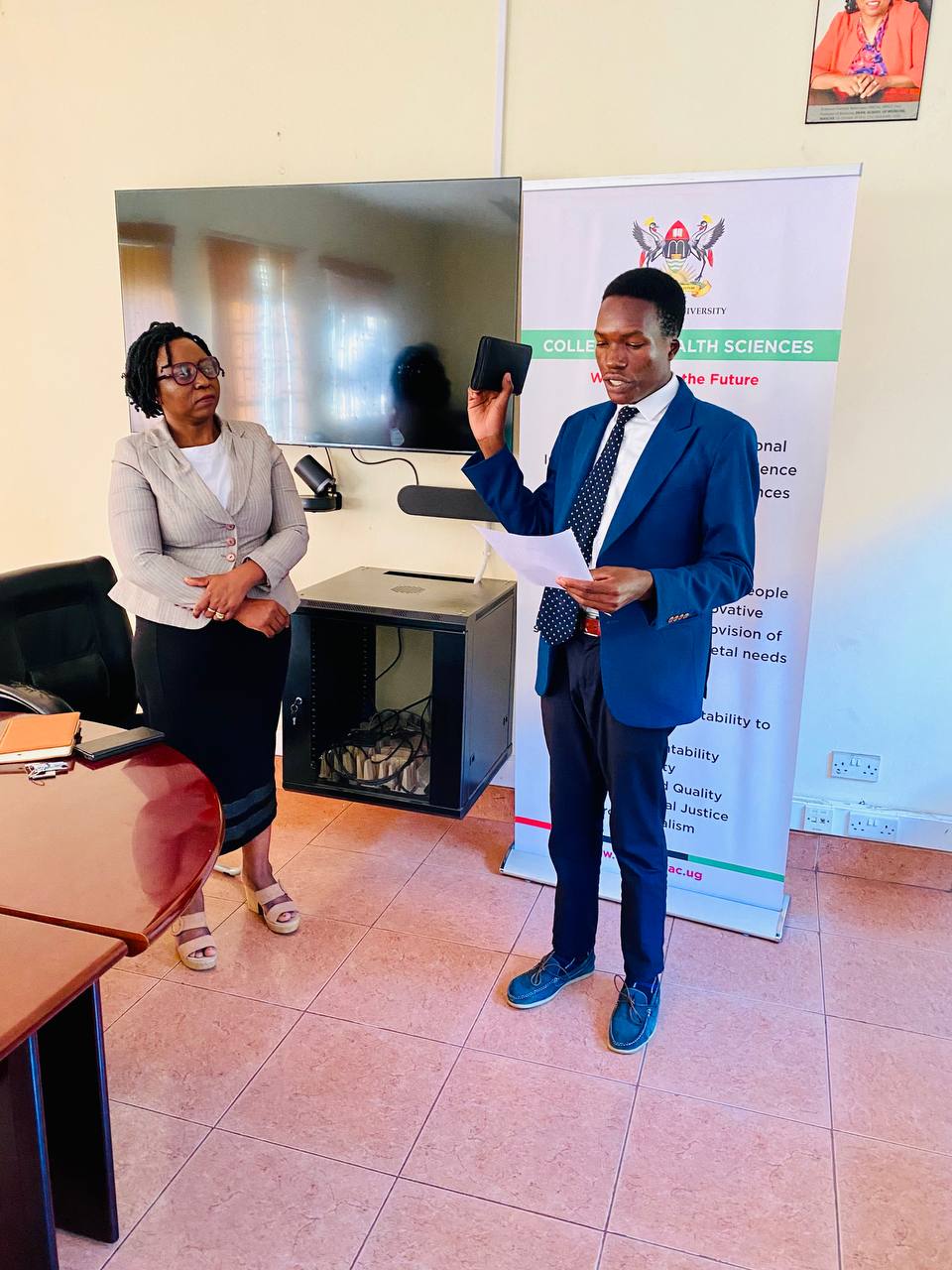
In 2021, during the second semester of the first year, the new ACMIS system [Academic Management Information System (ACMIS)] at Makerere University malfunctioned. This occurred around the time the university was transitioning from AIMS [Academic Information Management System-AIMS] to ACMIS. For Shafik, it presented a golden opportunity to take exams without meeting the payment requirements.
Madhvani Foundation Comes in handy
The twists and turns continued as he faced financial obstacles, including unpaid tuition and the demands of a university education, even in his final year.
However, the Madhvani scholarship only covered tuition and not functional fees. This meant that he had to struggle to raise funds for functional fees and accommodation, particularly after moving to University Hall, a male student’s residence on campus.
Shafik's involvement in student leadership, notably as the president of the Makerere University Environmental Health Students Association (MUEHSA), showcased his commitment to community engagement. Under his leadership, MUEHSA regained its lost glory, organizing conferences, community outreaches, and health education programs.
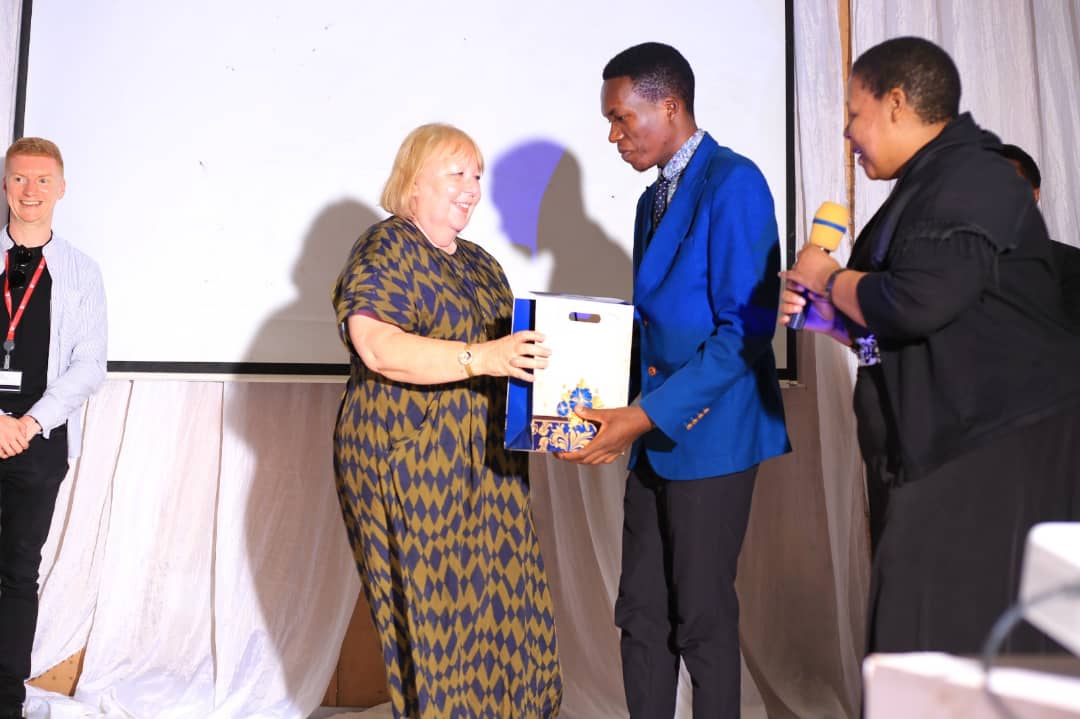
The pinnacle of his leadership journey was marked by the successful organization of the 18th Annual MUEHSA scientific conference, where stakeholders and students gathered to discuss pressing environmental health issues. Shafik's visionary leadership extended beyond MUEHSA when he became the first College of Health Sciences speaker in the new guild system.
Compiled by Davidson Ndyabahika

